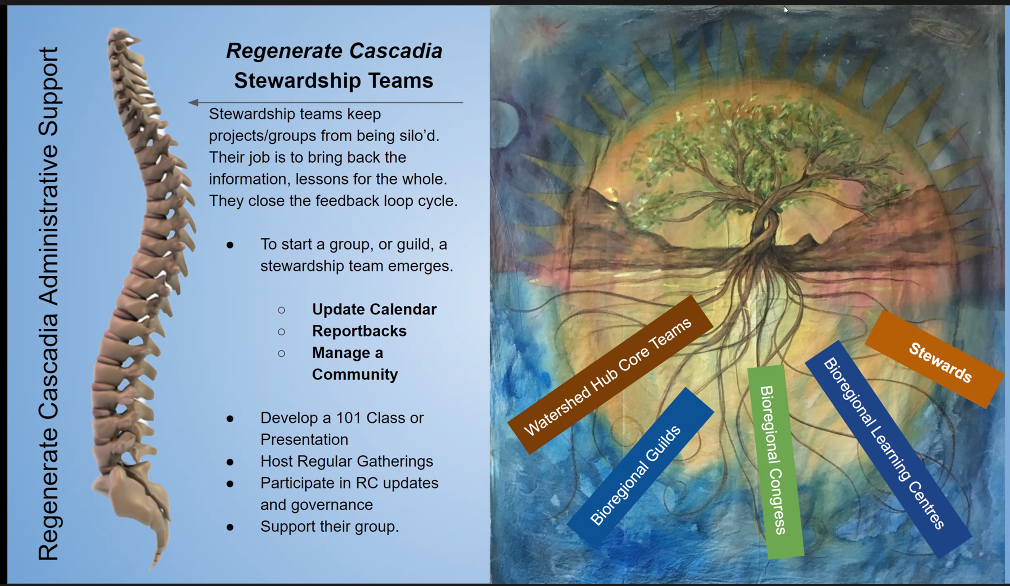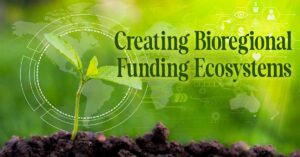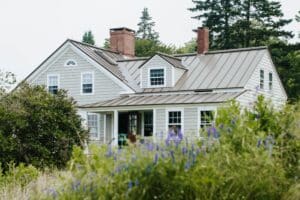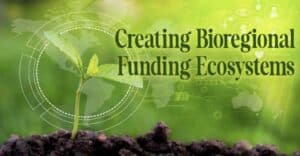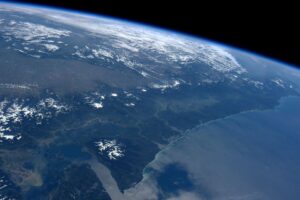Brandon Letsinger and Clare Attwell, the co-administrators for Regenerate Cascadia will share an update on what has happened since its launch in late May, 2023, where things are currently at, and what is being gestured towards. This is an opportunity to get a big picture overview of this huge, (and at times unwieldy) bioregional initiative, and see how you fit and can be involved in a way that makes sense for you. Please bring your questions.
Zoom Video Recording :
Zoom Chat is here.
Transcript is coming… meantime heres the first 14 inspiring minutes:
Brandon Letsinger (he/him) – Seattle / Salish Sea: Welcome and thank you everybody for joining our first Regenerate Cascadia information and update session. It’s been nearly a month since the Regenerate Cascadia Activation Tour and Summit wrapped up, and Clare and I can’t be more excited to share just a brief glimpse into what has been happening over the past month. Firstly, before we start, I did just want to take a moment and say Thank you to everybody who participated in our Cascadia activation tour which occurred through out every day of October.
I also want to say thank you to everybody who joined the Cascadia Summit and festival of what worked November 3rd – 12th. I’d like to say thank you to everybody who’s popped in since then. And then a huge thank you to everybody who has been trying to hang on and work with us through the Telegram group and threads. You all are the true heroes.
We will be recording this session for anybody who can’t make it, and and want to be able to share notes with people afterwards. This session will run for one and a half hours, and we hope that the presentation won’t take too long. But we do have a lot to cover. Then we want to have a questions and answers session. This is a kind of a first draft, and so we really do welcome any input and feedback. And we’ve also created this space on the Miro board and you’re welcome to go throw up notes and thoughts there. This is an emerging process, just like everything else.
Clare Attwell: Victoria, BC.: The land shapes the people and has shaped the longstanding history that has brought us to reside here. To give voice to Norm Leach, the director of the Vancouver Aboriginal Community Center, the land was here long before humans, and it will be here long after. When we acknowledge the land, we acknowledge our complete interdependence with the land and all our relations. We acknowledge and thank anyone, everyone doing the work of regeneration throughout Cascadia and Salmon Nation.
These acknowledgements do not exist in a past tense or a historical context. Climate change, extractive policies and colonization are current and ongoing processes, and by living here we are each part of the story of our place and have an accountability and duty to act.
Brandon: A growing number of people are recognizing that to secure the clean air, water, and food that we need to survive healthfully. We have to become guardians of the places where we live. People sense the loss, and not knowing our neighbors and natural surroundings, and are discovering that the best way to take care of ourselves is to go out and take action for ourselves when we define our places, using the earth as a frame of reference, taking into account flora, fauna, land forms, climate, and so on. We are talking in terms of Bioregions.
We are here tonight because this work that we are doing, and the work that you are doing is important. We have a choice and a brief window in time to shape the future for ourselves and future generations. It is up to Cascadians, each in their own way, to create and promote these changes and lead the way forward rather than to wait for someone else to do it for us.
Clare Attwell: Regenerate Cascadia has been developed as a long-term vision and process that works with on the ground communities to design and implement new frameworks of governance, ecology, and economy for the regeneration and health of our region. As many are seeing, this is much more than a tour and a summit. It is an opportunity to create a shared context for a Cascadia by a regional movement. With that in mind, some new context setting regarding the current and emerging governance and organizational structure is in order.
Regenerate Cascadia is truly a complex organism that was birthed during the activation tour in October. And indeed, it’s still being birthed. There is some core structure that has helped to incubate a vision that is rekindling and inspiring a bioregional movement whose time has come. It is important that those newly joining the movement understand what exists from an organizational perspective, what needs priority and attention in order to keep up the momentum. Most importantly, how do people find pathways for Co-creating what needs to emerge?
We are not trying to be the movement per se, but instead to grow regenerate. Cascadia as an organizational and movement backbone to provide services and administrative support and funding to create the conditions for regenerative movement to thrive together. We aim to connect organizers, projects and communities doing the work and see them supported with the tools and resources that they need and so just for those who haven’t met me, although I think I’ve met most of you. But for the recording as well. I’m Clare Atwell, I’m a community artist and weaver, based in Victoria, BC. In the heart of the sailish sea, which also the unseeded lands of the Lakwangon and Masonic speaking cause salish people.
Brandon Letsinger : My name is Brandon Letsinger. I’m an organizer. I’ve been doing work around Cascadia and Bioregionalism since 2005 and more recently, I’m the founder and director of the department of Bioregen, a 501c3 nonprofit based here in Seattle. Just as importantly as all of that who we are is a bioregional network of organizers, individuals, communities, and really leaders doing regenerative work out on the land. And together we’re kind of coming together to create this idea of Regenerate Cascadia as this movement backbone.
Clare and I are the primary conveners for Regenerate Cascadia. We are excited to partner with a fantastic community of catalyst from around Salmon Nation to ask ourselves the following questions, and to acknowledge the members of this growing community.
Just to say, I think to acknowledge the members of this growing community visible within the telegram threads and online events, as well as the many local leaders who have joined us to help organize every aspect of this movement that grows and changes daily, and we wholeheartedly need to recognize the gifts passed on to us by the elders of the bioregional movement, and further back the first peoples of this land, whose knowledge of place is a precious gift to all, including future generations, but whose who have been severely attacked and nearly destroyed.
Clare Attwell: For some historical context, Regenerate Cascadia started as a collaboration between Brandon and I during the 2023 Edge Prize which is an initiative by Salmon Nation and the Terran collective designed to bring a community of edge walkers, walkers on the edge of different communities, but tied to the whole to share open source indigenous knowledge for a more resilient world. More than 140 edge walkers from around the Cascadia Bioregion met for 8 weeks to explore place-based bioregional regeneration to tell their stories and practice, working cooperatively, to distribute funding to regenerative projects. Much of the ground work needed for bioregional regeneration is being done in our communities, but too often the work is siloed and not connected. During the enterprise Brandon and I recognized the mapping and empowering. The work already happening was what was missing.We saw a huge opportunity through catalyst, such as the activation tour and online summit, such as the regenerative community Network Summit last year to help weave a network that might spark a bioregeonal movement whose time has come.
Brandon Letsinger: How can we be mapping our work and using the incredible energy as these one-time activation tours and summits to keep the work going forwards for the long-term regeneration of our bioregion. The current goal for Regenerate Cascadia as part of a planetary network of bioregions is to develop a participatory framework of governance at a watershed ecoregional and bioregional scale, able to cooperatively steward a vision to build an informational commons to map and track what works and help it. Inform bioregional learning as well as to define clear metrics for success, and to assist in the creation of a bioregional regeneration fund that can support this work as defined by the landscape leaders themselves?
Can we begin to break down the system-driven silos that are dividing our work to connect those doing similar work and shift from the model of competitive ecosystems to collaborative ones? More than just gathering together landscape leaders or having a series of conversations that highlight our work. We need new systems of governance. This requires us to work, to cooperate locally and across scales in ways that most of us have never experienced or seen. It requires that we not just resist what is failing, but that we learn how to cocreate the frameworks and pathways that our planet and communities need to regenerate our watersheds and bio regions. To do this, we need to create the conditions to support networks of trust, led by dedicated people already doing this work in small isolated pockets in their communities.
Clare Attwell: Just to recap on the on the activation tour, for context, we traveled to14 different communities throughout Pacific Cascadia to learn, connect, and weave the regenerative work being done. We did this after having invited those willing to step up and help organize local gatherings, such as presentations, workshops, community dialogues, or field trips. During the activation tour. We were only in each community for a very short time. Yet the conversations and weaving that happened was electric. Wherever we went, we found that people were hungry to have these conversations. Over and over we were told, the people felt heard. Questions were being asked that hadn’t been asked before. People everywhere responded positively to the coherence of storytelling around a vision for a bioregionally interconnected Earth. People were just excited to discover others in neighboring watersheds and ecoregions that felt the way they did, recognizing the activation as a catalyst for this vision was inspired by the success of 2 similar events earlier this year.
The first involving 14 cities across the Great Lakes. The second involving multiple communities throughout the whole Colorado River Basin inviting the design school for Regenerating Earth to join us for a month long Biore regional activation tour throughout Salmon Nation is exciting because of the potential to effectively share this vision through coherent storytelling.
It was exciting for the design school for Regenerating Earth to (launch) their most ambitious schedule to date, and also the fact that Cascadia, probably one of the most active places on Earth when it comes to existing regenerative initiatives.So for those who don’t know the design school for Regenerating Earth is an online bioregional learning platform that connects landscape leaders across bioregions. It was founded by Joe Brewer, Penny Heipel and Benji Ross. It was Joe Brewer and Penny Heipel that toured with us and were joined by Stephen Morris, who is a member of the Design school and to help with the tax support.
One of the important principles that was established for doing the activation tours is that they needed to be invited into bioregions and watersheds.They did this, donating their time free of charge in service to what the land needs and for this tour. And Canada and the Cascadia Department of Bioregion invited Joe and Penny to come and lead an activation tour here in the Cascadia by Region by working with the design school for generating Earth. This work is, it’s really helped in making it to become replicable, replicable and scalable globally.
This is the first 14 min of the presentation. Want more? Watch the video at 00:13:45 to continue from here.

